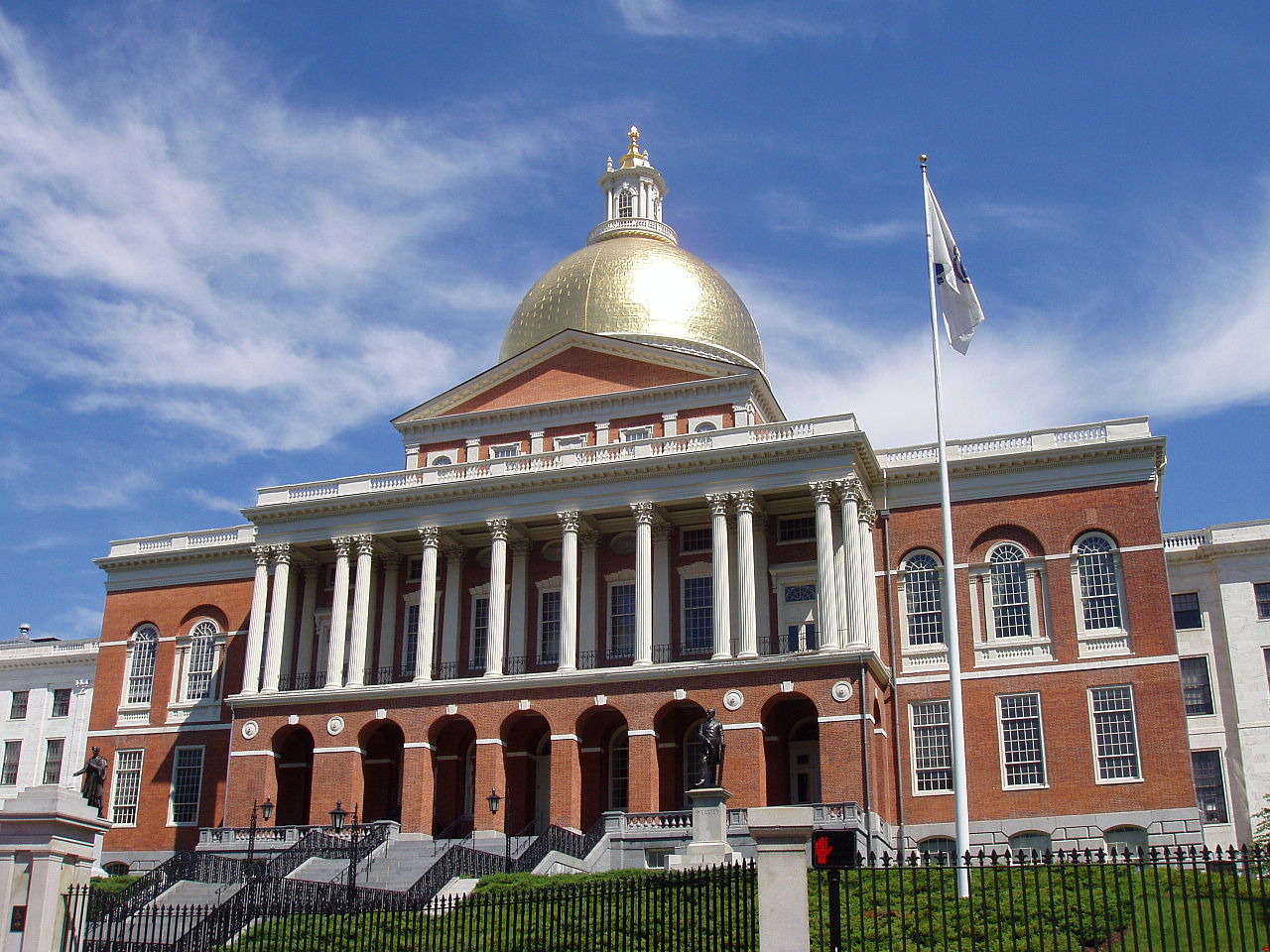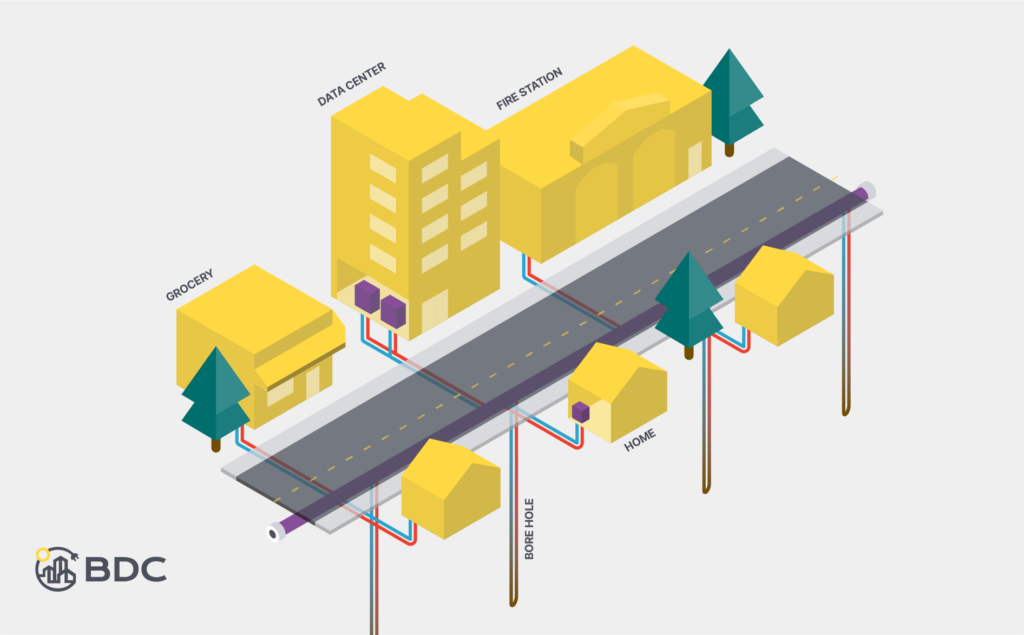
In April, the Wall Street Journal observed that “Underground Thermal Energy Networks May be About to Have their Moment.” With abundant thermal energy network legislation early in 2024, we agree.
Since 2021, seven states have passed legislation that mandates or allows regulated utilities to develop thermal energy network (TEN) pilot projects, with a goal of proving their viability as a utility-scale clean energy solution. Massachusetts and New York demonstrated early leadership on legislation promoting pilots, followed closely by Minnesota and Colorado.
From there, legislation has accelerated rapidly. Lessons from early legislation and pilots have guided states to examine their utility “obligation to serve” statutes, and to enshrine provisions supporting environmental justice communities and organized labor within their laws. In the first half of 2024, Washington, Maryland, and Vermont passed their first TENs-enabling legislation. Meanwhile, Massachusetts, New York, and Minnesota have proposed or passed crucial refinements to existing legal frameworks, aiming to scale up TENs from singular pilots to comprehensive, long-term strategic plans for gas utilities, their workers, and their customers.
Here we provide a brief history of legislation that has passed as of June 2024, and highlight key provisions and outcomes of that legislation.
|
What are thermal energy networks? Thermal energy networks (TENs) are an elegant solution to a complex problem that communities across the country face: eliminating the use of fossil fuels in our buildings, at scale. TENs replace the gas pipe infrastructure that’s currently used to heat buildings with an underground water loop, and use heat pumps installed in each building to transfer heating and cooling throughout the network. Learn more about system designs here. Where are thermal energy networks? While legislation mandating or permitting utilities to operate TENs is new, the technology has long operated in public and private settings. Read about some existing TENs here. |

A thermal energy network at work: A grocery store, data center, fire station, and home exchange thermal energy with the ground through water-filled pipes and shallow boreholes.
2021: The beginning

Massachusetts was the first state to enshrine provisions for TEN pilots in law, using their 2021 Climate Roadmap to do so. This roadmap permits utilities to pilot networked geothermal projects. Since the passage of that law, five pilots have been approved in Massachusetts.

Minnesota passed the Natural Gas Innovation Act (NGIA), which allows gas utilities to propose “innovation plans” that consider low-emission alternatives to methane gas, including district thermal energy as well as carbon capture and storage, hydrogen, and RNG.
2022: Groundbreaking legislation

In 2022, New York passed the groundbreaking Utility Thermal Energy Network and Jobs Act (UTENJA). This bill enables both gas and electric utilities to own, operate, and manage thermal energy networks.
This law was supported by a diverse range of stakeholders who have not historically been aligned on issues related to building decarbonization. Environmental organizations, environmental justice advocates, organized labor, consumer advocates, building industry, and utilities collaborated on a bill that not only allowed for the creation of utility-scale thermal energy infrastructure projects, but also laid the groundwork for a just transition for utility workers and the inclusion of under-represented workers in labor unions through pre-apprenticeship programs.

In 2022, Massachusetts’ Clean Energy and Offshore Wind bill added provisions specifying that TEN pilots can be paid for with funds from the state’s pipe replacement program, known as the Gas System Enhancement Plan (which our friends at HEET explain well here).

In 2022, Governor Jared Polis of Colorado identified geothermal energy as the annual theme of the Western Governors’ Association, which he titled “The Heat Beneath Our Feet.” That same year, two bills supporting the development of geothermal energy (Geothermal Energy Grant, Program HB22-1381 and Encourage Geothermal Energy Use SB22-118) became law. These policies and projects were bolstered by the 2021 clean heat standard (SB21-264), which requires gas utilities to file plans to reduce GHG emissions from end uses by 4% by 2025 and 22% by 2030, and the Utility Regulation Bill (Removing Barriers to Clean Heat (SB23-291), which eliminates gas line extension allowances.
2023: Western states turn up the heat; pilots advance

Colorado passed its first law specifically advancing TENs. The Thermal Energy Act (HB23-1252) modifies the state’s existing clean heat standard by stipulating that thermal energy networks can be counted as an acceptable “clean heat measure” to meet GHG reduction goals. In addition, it mandates that large gas utilities (serving >500,000 customers) propose at least one TEN pilot by September 2024.
The law went further to establish labor standards for state or public university-owned thermal energy projects and tasks the Colorado PUC in creating rules around the regulation of this technology, determining if additional legislation is necessary, and considering the impact that the proposed pilots will have on the state’s utility workforce.

In 2023, Washington State’s Department of Commerce published their Biennial Energy Report, recommending that the state’s natural gas utilities plan for the upcoming transition to clean heat.

New York utilities proposed 12 TENs pilots to comply with the 2022 UTENJA law, with selections in rural, suburban, and urban communities across the state.

By 2023, four pilots had been approved in Massachusetts. Eversource Energy began construction on the first gas utility-installed networked geothermal system in the nation, located in Framingham, MA, and National Grid broke ground on its first networked geothermal system in Lowell
2024: A legislative heatwave: TENs take off and scale up
Washington, Maryland, and Vermont passed their first TENs-enabling legislation, learning from the successes and challenges of New York’s UTENJA and Massachusetts’ pilot projects.

Washington became the first state of 2024 to pass TENs-enabling legislation when Governor Inslee signed An Act Promoting the Establishment of Thermal Energy Networks in March. The act tackles multiple challenges that must be overcome to equitably scale up and institutionalize TENs. Specifically, it:
- Modifies the “obligation to serve” by allowing gas utilities to fulfill their obligation through thermal energy networks, subject to commission approval.
- Expands the definition of electric and gas companies to allow them to own and operate thermal energy infrastructure.
- Allows public utility districts to own, operate, and manage TENs with oversight from their governing body.
- Allows rate mergers between gas and thermal rate bases for the pilots, and allows utilities to submit a rate case to recover TENs costs.
- Establishes a TENs pilot program for gas utilities, requiring proposal submissions within 12 months of June 2024 and construction within 30 months.
- Requires pilots to meet criteria for labor involvement, equity, justice, and innovation.
- Allocates TENs grant funding of $25 million and encourages utilities and agencies to use the funds to promote project diversity and knowledge sharing.

Maryland became the year’s second state to pass legislation in support of thermal energy networks. The Working for Accessible Renewable Maryland Thermal Heat (WARMTH) Act:
- Allows gas, water, and electric utilities to own, manage, and recover costs associated with thermal energy networks, if approved by the PUC.
- Includes strong labor provisions for front- and behind-the-meter work related to thermal energy networks, including prevailing wage and apprenticeship requirements for contractors.
- Allows gas companies serving <75,000 customers to propose one pilot, and mandates companies serving >75,000 customers to propose at least one and up to two pilots.
- Requires that at least 80% of pilot customers qualify as low- and middle-income.
- Requires gas companies to seek federal and state funding for electrification, and includes provisions to enable utilities to apply for investor tax credits.
- Funds community-based organizations (CBOs) conducting outreach to increase participation in a TENs pilot.

Vermont joined the cohort of states passing TENs-enabling legislation. S.305, which authorizes thermal energy networks across the state, is unique in that opens multiple pathways for communities to build TENs:
- Municipalities can form thermal energy utilities without PUC approval (as they do for water and sewer utilities).
- Existing utilities, businesses, developers, co-ops, and nonprofits can also seek authorization to operate TENs under PUC supervision, setting rates and providing service to thermal energy customers.
- Owners of campus, condominiums, cooperatives or tenant properties are not affected by this law; the owner is authorized to provide a TEN to itself and its members or tenants, so long as it complies with existing zoning and municipal laws.
Meanwhile, Minnesota passed exciting new TENs legislation, while Massachusetts and New York proposed laws that would scale up TENs in their states:

Minnesota’s legislature proposed multiple provisions in support of thermal energy network advancement. Many successfully passed, embedded within omnibus bills, within hours of the end of session at 12:00 a.m. on May 20, 2024.
SF4942 / HF 4975, the omnibus agriculture, commerce, energy, utilities, and climate appropriations bill, included the following thermal energy network-related provisions:
- $500,000 in appropriations for a statewide TENs site suitability study.
- $39,000 in appropriations in 2025 to fund a TENs working group at the Public Utilities Commission (PUC), with another $77,000 slated for appropriation in 2026.
- A grant program of up to $150,000 that will allow local governments to perform technical analyses of geothermal systems.
- A requirement for gas utilities to invest at least 15% minimum of their NGIA “innovation plans” in TENs—raising the bar on what was previously a 10% maximum.
And SF3887 / HF 3911, the omnibus environment and natural resources bill, provides the Pollution Control Agency with the power to “encourage practices that enable the recovery and use of waste heat from wastewater treatment operations,” which could make wastewater reservoirs valuable heat sources for future TENs.
In addition, as of April 2024, the state’s major gas utilities (Centerpoint Energy and Xcel Energy) have each included thermal energy network pilots in their NGIA “innovation plans” submissions.

In April 2024, New York’s Department of Public Service (DPS) approved nine pilot proposals to advance from the scoping to the engineering phase.
Many of the organizations that worked on UTENJA continued to advocate for the development of thermal energy networks through UpgradeNY. This collaboration of unions, climate justice advocates, building industry representatives, and environmental groups is calling for policymakers to decarbonize New York’s state-owned buildings and schools through a local, union-led workforce.
In early 2024, the New York State Senate passed the New York HEAT Act, but in April, the Act was not incorporated into the approved FY2025 State Budget. The Act proposed to end outdated gas expansion subsidies such as the “100 Foot Rule” and create opportunities for further cost savings by retiring old gas distribution systems when they are no longer necessary and can be replaced with cost-effective alternatives like TENs.

Massachusetts continues to propose legislation to refine and promote thermal energy networks in 2024. The Future of Clean Heat bill contains several provisions that would authorize, incentivize, and finance the transition from gas to non-combustion renewable thermal energy. The bill would permit gas utilities to meet the “obligation to serve” by providing customers with thermal energy, including networked geothermal ground source heat pumps or air source heat pump, and prioritize current gas pipeline workers for work on the clean energy transition. It would also establish a “thermal transition fund” to finance ongoing thermal energy network installations and disallow depreciation of new gas infrastructure beyond 2050 in line with the Commonwealth’s net-zero emissions mandate.
In January 2024, the City of Boston announced the site for the third utility pilot in the State, and in June 2024, the nation’s first utility pilot became operational in Framingham.

Additional Support for Thermal Energy Networks
Federal and state research and support for TENs is growing, even outside of state legislatures:
- In 2023, the Department of Energy awarded $13 million in federal grants to 11 communities across 10 states to explore thermal energy systems.
- New York State Energy Research and Development Authority (NYSERDA) has awarded over 35 grants for thermal energy network feasibility studies in the state.
- The Massachusetts Clean Energy Center, in collaboration with HEET, provided funding to 13 communities across the Commonwealth to explore the installation of networked geothermal projects. 50% of this money was awarded to environmental justice communities.
- In 2024, Colorado’s Energy Office awarded $7.7 million for geothermal projects across the state, including multiple TENs.
Which state will be next?
Stay updated on the swell of thermal energy network legislation across the United States. Subscribe to the monthly BDC newsletter, connect with us on LinkedIn, or follow us on Twitter/X for regular legislative updates.
